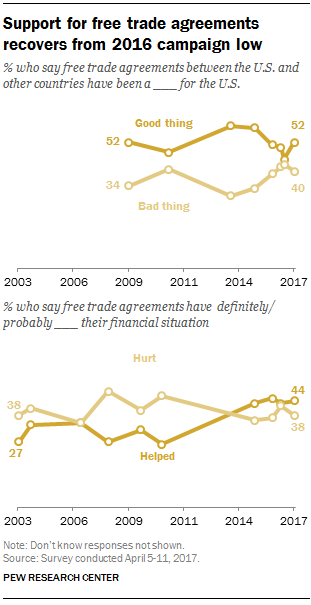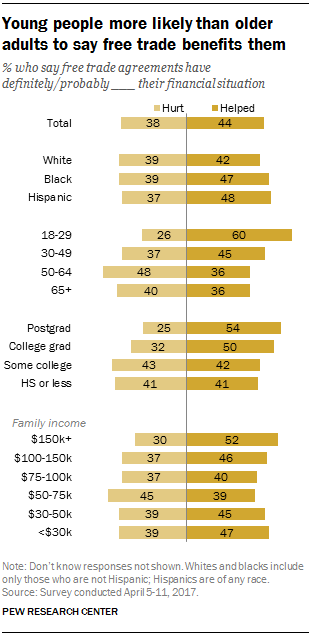Americans’ support for free trade agreements, which fell sharply during the 2016 presidential campaign, has rebounded modestly. The partisan gap in views of trade agreements remains substantial, with Republicans far more likely than Democrats to have a skeptical view of these agreements.
 Currently, 52% say free trade agreements between the United States and other countries are a good thing for the U.S., while 40% view them as a bad thing, according to a recent survey by Pew Research Center. In October, during the campaign’s final weeks, just 45% expressed positive opinions of free trade agreements. Current views of free trade remain less positive than they were in May 2015, when 58% said these agreements were good for the U.S.
Currently, 52% say free trade agreements between the United States and other countries are a good thing for the U.S., while 40% view them as a bad thing, according to a recent survey by Pew Research Center. In October, during the campaign’s final weeks, just 45% expressed positive opinions of free trade agreements. Current views of free trade remain less positive than they were in May 2015, when 58% said these agreements were good for the U.S.
Americans’ views of how free trade agreements have affected their families’ finances have shown less change in recent years. Today, 44% say free trade agreements have definitely or probably helped their financial situation, while 38% say they have definitely or probably hurt their finances.
These overall views have changed only modestly since 2015. Views of the personal financial impact of trade agreements were more negative during the Great Recession and its aftermath. In November 2010, for instance, only about a quarter (26%) said trade agreements had helped their finances, while 46% said these agreements had hurt their finances.
 Among Republicans, positive views of free trade plummeted during the presidential contest, when Donald Trump made opposition to trade agreements a signature issue of his campaign.
Among Republicans, positive views of free trade plummeted during the presidential contest, when Donald Trump made opposition to trade agreements a signature issue of his campaign.
In October, just 29% of Republicans and Republican-leaning independents said free trade agreements have been good for the U.S., down from 56% just a year-and-a-half earlier. Today, 36% of Republicans view trade agreements positively, an increase of seven percentage points from October.
Democrats were far more supportive than Republicans of free trade agreements throughout the presidential campaign, and remain so today. Currently, 67% of Democrats and Democratic leaners say free trade agreements have been good for the U.S., up from 59% in October.
Republicans also express more skepticism than Democrats about the personal economic benefits of free trade agreements. Just 35% of Republicans, compared with 54% of Democrats, currently say trade agreements have helped their finances. These views are little changed over the past year. However, for much of the recent past, and as recently as May 2015, Democrats and Republicans were about equally likely to say free trade agreements helped their family.
Throughout most of the George W. Bush administration, Republicans were more likely than Democrats to view the personal impact of trade positively. For example, in December 2006, 44% of Republicans said trade agreements had helped their finances compared with just 31% of Democrats.
 As has been the case in the past, free trade agreements are viewed far more positively by younger people than older adults. Majorities of those under 30 (67%) and those ages 30 to 49 (58%) say free trade agreements have been good for the country. Among those 50 and older, just 41% say free trade agreements have been a good thing.
As has been the case in the past, free trade agreements are viewed far more positively by younger people than older adults. Majorities of those under 30 (67%) and those ages 30 to 49 (58%) say free trade agreements have been good for the country. Among those 50 and older, just 41% say free trade agreements have been a good thing.
By roughly two-to-one, both blacks (62% to 29%) and Hispanics (63% to 33%) are more likely to say free trade agreements have been good for the country than to say they have been bad for the country. By contrast, whites are divided in their views of the impact of free trade agreements (47% say they have been a good thing, 44% say they have been a bad thing).
Those with postgraduate degrees view free trade agreements positively by about two-to-one (61% good thing, 29% bad thing). Opinion is more evenly divided among those who have not completed college. There are only slight differences in these views by family income.
 Similarly, those with college degrees are more likely than those who have not graduated from college to say free trade agreements have helped their family’s financial situation (51% vs. 41%).
Similarly, those with college degrees are more likely than those who have not graduated from college to say free trade agreements have helped their family’s financial situation (51% vs. 41%).
Age also is a factor in these views: By more than two-to-one (60% vs. 26%), those younger than 30 say they have been helped more than hurt financially by free trade agreements. Those in older age groups are more divided in their views of the personal impact of free trade agreements.
While blacks and Hispanics are more likely than whites to say that free trade agreements have been good for the country, there are no differences in views of the personal financial impact of trade agreements across racial and ethnic groups.
In general, however, opinions about the effects of free trade agreements on the country and the effects of trade on people’s personal finances are linked: 70% of those who say free trade agreements are good for the country also say they have been helped financially by such agreements and a similar share (74%) of those who say these agreements are a bad thing say they have been hurt.
Note: The full topline for this post can be found here (PDF), and the methodology is here.



